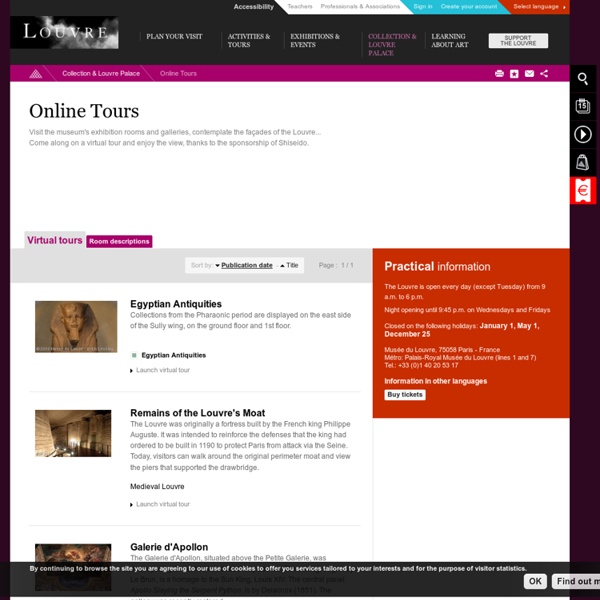Auschwitz-Birkenau Virtual Tour - Auschwitz-Birkenau - Wirtualne zwiedzanie
AirPano.ru
Free Images - FreeJPG
In freejpg can find images with three different types of license: License Basic You can: No Mention Author - No attribution to the original author . Edit image - to adapt the work . Commercial Use - use this picture for commercial purposes. You can not: You can not sell, license, sublicense, rent, transfer or distribute this image exactly as it is without alteration .. free License Creative Commons 2.0 detailed License License Public Domain detailed License FreeJpg not responsible for infringing intellectual property rights and / or people.
75 serious games pour choisir son métier
En plein stress des examens du bac blanc, les lycéens doivent aussi choisir leur avenir et s’inscrire dans les écoles correspondantes. Les inscriptions étant à faire avant le 20 mars, voici un guide des métiers en serious game pour aider à choisir son orientation et découvrir différents métiers. Le CRIJ du limousin a publié un document intéractif intitulé « Panorama des serious game métiers », mis en place par le ministère chargé de la jeunesse. Je vous ai fait une petite sélection de jeux à (re)découvrir. Parmi eux EHPAD’PANIC, un serious game de formation pour le personnel en EHPAD. InfinITY Un serious game pour découvrir les métiers des TIC à travers une enquête pour vous faire incarner différents métiers. Jeu d’influences Suite au décès d’un de vos collaborateur, vous allez vous retrouver en pleine crise médiatique. Réfugiés Avec Réfugiés entrez dans la peau d’un reporter, découvrez les camps de réfugiés et racontez ce qu’il s’y passe. Laura Gassin
Google Earth. Le monde comme vous ne l’avez jamais vu – Les Outils Tice
Dernière mise à jour le 9 février 2025 Google Earth offre depuis un moment un étonnant moyen de découvrir et de faire découvrir la planète. Un outil pédagogique qui permet de nombreux usages pour un enseignant et ses élèves. Cet outil pédagogique permet de nombreux usages pour un enseignant et ses élèves. Avec Google Earth Pro, gratuit pour les enseignants, vous pouvez aller encore plus loin dans l’exploration. On peut penser tout ce que l’on veut de Google, mais le géant californien propose des outils incroyables, dont certains sont de véritables pépites : Google Arts et Culture, Google Maps, Google Street View, et bien sûr Google Earth, une ressource qui mérite toute votre attention. Une expérience immersive avec Google Earth La version web et mobile de Google Earth est réellement épatante. Un nouveau bouton 3D vous permet de visualiser les bâtiments et chaque endroit sous différents angles. Découvrez le monde entier avec des outils interactifs Bon voyage avec Google Earth
olats.org
Quelle est l'histoire de "l'art des nouveaux médias" dans l'art de la seconde moitié du XXe siècle ? Les courants et les mouvements L'art cinétique L'art conceptuel Fluxus Happening & performance Land art Les groupes et les institutions de l'art technoscientifique Black Mountain College Jikken Kôbô E.A.T., Experiments in Art and Technology C.A.V.S., Center for Visual Advanced Visual Studies Idées, principes et concepts Les matériaux de l'art Les lieux de l'art Objets finis versus processus Le temps L'espace versus les espaces Le multi media Dématérialisation de l'œuvre Nouvelle position de l'artiste Nouvelle position du spectateur Conclusion : quelles filiations dans les analyses théoriques ? Le symbole Ö avant ou après un mot indique un lien vers une autre fiche du module. L'objectif n'est pas ici de reprendre en détail l'histoire de l'art de la seconde moitié du XXe siècle mais d'indiquer quelques points de repères et éléments clés.
Jeux sérieux gratuits 2
À l'assaut : Selon le principe des livres dont vous êtes le héros, vous tenez le rôle d'un soldat dans les tranchées lors de la Première guerre mondiale. Vos choix influeront alors sur votre vie ou votre mort. Une reconstitution cathartique en dessins animés qui touchera les plus jeunes. suiteLe bélier d'Antaka : Par le biais de jeux questionnaires et d'animations, vous irez à la recherche d'un petit jouet créé il y a 22 siècles. De plus, vous en apprendrez davantage sur l'archéologie et les civilisations anciennes. suiteLe code perdu : Ce jeu d'enquête se situe dans 3 lieux historiques du Québec. Vous devrez fouiller ces lieux pour résoudre des énigmes et obtenir le fameux code perdu.
10 magnifiques visites virtuelles dans les plus grands musées européens
Dernière mise à jour le 14 octobre 2022 L’art et la culture pour s’évader ou du moins tenter de le faire pendant cette période de confinement. Voici une liste de grands musées européens qui vous offrent des visites virtuelles de leurs salles et expositions. Des visites à 360° pour une immersion réussie dans les plus belles oeuvres du patrimoine. Le Musée d’Orsay à Paris L’un des plus grands musées d’Art d’Europe vous invite à vous promener virtuellement dans cette magnifique ancienne gare sur les bords de Seine. La petite galerie du Louvre La Petite Galerie du Louvre est un espace dédié à l’art et à l’éducation culturelle. Le Musée du Quai Branly Visite virtuelle dans le magnifique bâtiment imaginé par Jean Nouvel. Le British Muséum à Londres Le célébrissime musée Londonien permet aux visiteurs virtuels de visiter la Grande Cour et de découvrir l’ancienne pierre de Rosette et les momies égyptiennes. La chapelle sixtine au Vatican Le musée du Vatican est un des plus riches au monde. À suivre.



